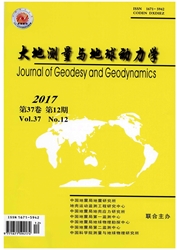

 中文摘要:
中文摘要:
利用CSR公布的GRACE RL05月重力场数据,采用多种滤波方法推算全球平均海水质量变化,并与GFZ公布的已滤波数据DDK1~DDK5估算结果进行比较。结果表明,不同的滤波方法对估算全球平均海水质量变化结果的影响是显著的,主要体现在信号的空间分布、时间序列以及拟合的趋势项3个方面。2002~2014年CSR RL05数据多种滤波估算的全球海水质量变化速率为1.17~1.26mm/a,GFZ DDK数据显示的速率为1.29~1.45mm/a,两组数据给出的加速度项分别为0.1mm/a2、0.07mm/a2。
 英文摘要:
英文摘要:
Using GRACE gravity field solutions(RL05)released by the CSR,we estimate the global mean ocean mass change by applying several different filtering methods.To compare,we also use GRACE-based DDK1-DDK5 filtered datasets provided by GFZ to estimate global mean ocean mass change.The results show that different filtering methods lead to significant differences in estimates of global ocean mass change,including geographic patterns,time evolution and frequency characteristics.During the period from 2002 to 2014,an increase rate of global mean ocean mass change is 1.17-1.26mm/agiven by CSR RL05 datasets and 1.29-1.45mm/a derived from GFZ DDK solution;the acceleration of the two datasets are 0.1mm/a2 and 0.07mm/a2 respectively.
 同期刊论文项目
同期刊论文项目
 同项目期刊论文
同项目期刊论文
 期刊信息
期刊信息
